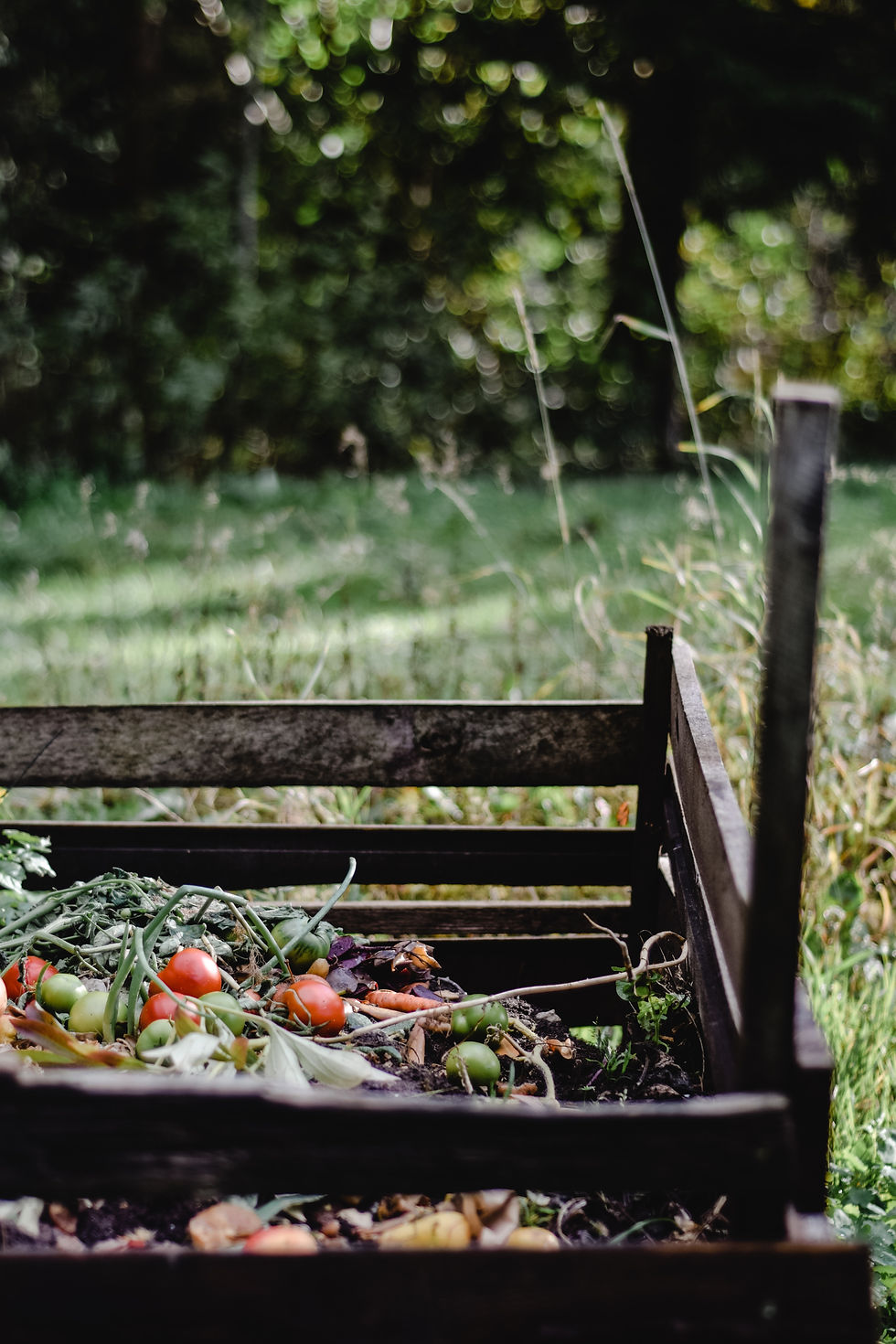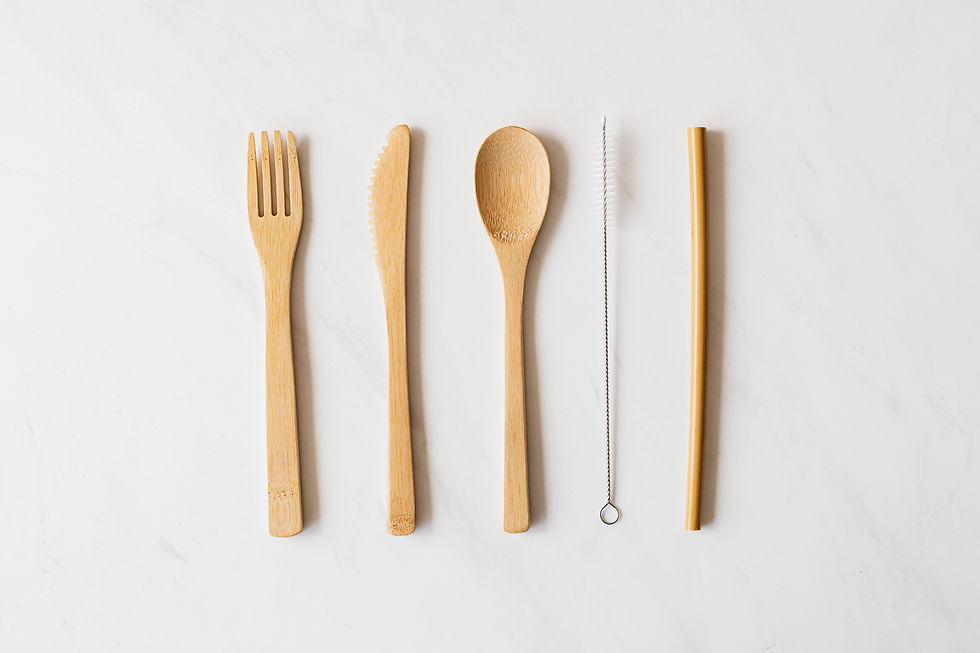6 Practical Steps to a Zero-Waste Kitchen
- Rachel Irwing

- Sep 21, 2021
- 6 min read

Today I wanted to discuss some simple ways you can make your kitchen more "zero-waste" or sustainable. First, I think it's important that we define sustainability. I am going to combine my favorite two definitions into one because I think that it hits all the important points. Sustainability is, "avoidance of the depletion of natural resources in order to maintain an ecological balance and the capacity for Earth's biosphere and human civilization to co-exist".
Some people think that if you care about sustainability you do not care about humans or the economy - this is not true at all! Being sustainable means trying to live life the way you want to, BUT changing out some actions to be more mindful of the effects it has on the environment. There are also stereotypes about being more sustainable or eco-friendly, and the biggest one that people struggle with is someone calling them a "Tree Hugger". Also, not true (I mean I don't mind being called one because ... if the shoe fits ...), but caring about what happens to our environment or being mindful of your actions does not link to a political or spiritual affiliation and does not mean that you are "one of those tree huggers or snowflakes". It means, you want humans to SURVIVE.
Being sustainable and responsible for you actions actually means that you want humans to live, you want to allow us to co-exist with our environment so we can live comfortably, for longer. One of the most important benefits of becoming more sustainable is actually saving money! I always try to tell people, if you do not have a soft spot for the environment, at least think about your pocket. Most, if not all sustainable actions will save you money, which is amazing! You work hard for your money and being able to save some of that, is worth a few household or lifestyle adjustments!
Today I will be talking about 6 easy-peasy ways you can be more sustainable in your kitchen. Becoming zero-waste is difficult. There are some steps that you can take, to ease your way in (heck we are trying them too!).
1. Compost
The first item on our list is composting. Now, this is probably the most difficult item on the list (but still not hard). Composting kind of has a reputation of being something that is really hard to do and is limited to those with a house and a big backyard, but that's not the case! Composting has really come a long way and many big-box stores now carry "apartment compost bins" or "countertop-compost bins". This are inexpensive and easy to use in small spaces! I even saw one in Aldi this week!

Whether you have a nice backyard where you can turn your kitchen scraps into a large compost pile or a small apartment that has a great place for your countertop compost bin, you should definitely give it a try. Saving your food scraps and composting them, gives you free fertilizer for you plants! Also, some a lot of people don't know is that even though your food waste is biodegradable - once it's put in a landfill with all the other items discarded, they can't break down! Landfills are designed for storage, not for decomposition, therefore the lack of oxygen present hinders the decomposition process. The food scraps end up just sitting there releasing methane which is one of the worst greenhouse gases (GFGs).
Note: Natalie and I are hoping to bring you a post-series on composting! We will be trying out both ways, 1) using the countertop bin and 2) an outside pile and reporting to you along the way. Stay tuned for this!

2. Use food scraps for innovative snacks/meals
This is my favorite item on the list, because it's fun! You can turn the parts of fruits and veggies that you normally throw out and use them for other meals (before they hit the compost bin). One of my favorite examples are carrot tops. For Thanksgiving two years ago, Rob and I purchased multicolored carrot bunches to make roasted carrots as our contribution to the family dinner. But we were left with tons of carrot greens ... I felt so bad just tossing them so instead I turned them into a delicious carrot top pesto, that we also brought over and topped the carrots with! It was a hit among our family. You can also use your potato skins to make a crunchy potato stick snack, just cut the skins into tiny little match sticks, coat with a little bit of oil and salt and pop them in the oven, air fryer or pan fry them! There are tons of recipes like this and with a little creativity and innovation you can reduce the amount of household waste your family is generating!
3. Swap out plastic containers for glass & plastic bags to canvas
Swapping out plastic is probably one of the easiest things you can do. Why? because a lot of you grocery items come in a "free" container! Instead of recycling or tossing out your spaghetti sauce jars, wash them out and store your beans or other dry ingredients! I've been using my old pesto jar to store my bulk pine-nuts, so I can make more pesto! I also love using glass jars for meal preps, salads, ramen, soups, etc. One of my biggest pet peeves are seeing people get 100's of plastic bags for their groceries at the grocery store, just to go home and throw them away or store them in the back of a cabinet. Instead of doing this, you can say "no bags please" at the register and put everything back in your cart. You can keep a tote bin in your car and load all of you groceries in there OR use canvas/reusable bags. A lot of stores have promotions where you can even get free reusable bags!
4. Buy in bulk
Buying in bulk will not only reduce your household waste, but it will also reduce the amount of money you dish out for groceries! Just take a small reusable bag or mason jar, TARE it (weigh the item first before putting your ingredients in it) and then fill it with the amount of food you will need for the week. I love doing this because sometimes you don't need 3 lbs of rice or 5 lbs of flour, it's nice being able to pay for exactly the amount that you need! I have a whole cabinet of bulk staples I keep on hand, these really come in handy and honestly are pretty cute!

5. Make food items and cleaners from scratch
A lot of people shy away from doing these things because of their time constraint, between work, kids, pets and a social life (not to mention trying to get a full nights rest) can be a big contributing factor to not wanting to spend whatever little time you have to making your own products. I totally understand this, I usually balance university with 2 or 3 jobs, hobbies, a family and try to maintain somewhat of a social life. But making these products doesn't have to be hard! Food items for example can be prepped out a head of time, lets refer back to the pesto - by throwing a few ingredients into a food processor and pouring it into a glass jar, you have yourself a good base for your lunches or dinners for the week. This is typically more inexpensive than purchasing pre-made products. For household cleaners, you can use white vinegar to do you daily wiping, if you don't like the smell you can also throw an orange or lemon peel in the bottle to make it smell better! There are also tons more recipes for household cleaners that sanitize, etc. We will be incorporating these types of recipes into the collective as well.
6. Stop using single-use paper/styrofoam items
This one is a no-brainer. Stop wasting your money on paper towels, plastic utensils and single-use plates. Use your ceramic dishes that are staring at you from your cabinets. This is a huge hinder to your pocket. Think about it, you are buying something to literally throw into the bin. Essentially, throwing your money into the trash can after eating one plate of pasta. Not to mention, Styrofoam is not recyclable! This is a big misconception. Also, stop using those plastic straws and purchase some metal or reusable-plastic straws. These swaps do not have to be expensive, you can find them in discount stores! Most of my straw collection was purchased at ROSS, for under $3.00. That's almost an infinite number of uses for $3.00 as opposed to $3.00 for one box of single-use straws that I would have to keep replenishing over and over!

We hope you learned something new from this list and are empowered to take a few simple steps to making your kitchen more sustainable and working towards becoming zero-waste! Stay tuned and subscribe to our website so we can bring you more content that's specific to your lifestyle! Remember, small steps matter!




![[REVIEW] Good Catch Vegan Crab Cakes](https://static.wixstatic.com/media/11024d_3ac3211eaa9544fd864e47d8a292b154~mv2.png/v1/fill/w_980,h_980,al_c,q_90,usm_0.66_1.00_0.01,enc_avif,quality_auto/11024d_3ac3211eaa9544fd864e47d8a292b154~mv2.png)
![[R E V I E W] Organic Superfood Energy Shake - Vanilla](https://static.wixstatic.com/media/11024d_b76c4cd492084f8f949bb9fb8ac0603c~mv2.png/v1/fill/w_980,h_980,al_c,q_90,usm_0.66_1.00_0.01,enc_avif,quality_auto/11024d_b76c4cd492084f8f949bb9fb8ac0603c~mv2.png)
![[vegan] Italian Wedding Soup](https://static.wixstatic.com/media/11024d_ef6219e6635b4f029943bf6fa294a46a~mv2.png/v1/fill/w_250,h_250,fp_0.50_0.50,q_35,blur_30,enc_avif,quality_auto/11024d_ef6219e6635b4f029943bf6fa294a46a~mv2.webp)
![[vegan] Italian Wedding Soup](https://static.wixstatic.com/media/11024d_ef6219e6635b4f029943bf6fa294a46a~mv2.png/v1/fill/w_54,h_54,fp_0.50_0.50,q_95,enc_avif,quality_auto/11024d_ef6219e6635b4f029943bf6fa294a46a~mv2.webp)
![[R E V I E W] Daring. Breaded Plant Chicken Pieces](https://static.wixstatic.com/media/11024d_bb6241d754044a84b629c128343e62f2~mv2.png/v1/fill/w_250,h_250,fp_0.50_0.50,q_35,blur_30,enc_avif,quality_auto/11024d_bb6241d754044a84b629c128343e62f2~mv2.webp)
![[R E V I E W] Daring. Breaded Plant Chicken Pieces](https://static.wixstatic.com/media/11024d_bb6241d754044a84b629c128343e62f2~mv2.png/v1/fill/w_54,h_54,fp_0.50_0.50,q_95,enc_avif,quality_auto/11024d_bb6241d754044a84b629c128343e62f2~mv2.webp)


![[REVIEW] Good Catch Vegan Crab Cakes](https://static.wixstatic.com/media/11024d_3ac3211eaa9544fd864e47d8a292b154~mv2.png/v1/fill/w_250,h_250,fp_0.50_0.50,q_35,blur_30,enc_avif,quality_auto/11024d_3ac3211eaa9544fd864e47d8a292b154~mv2.webp)
![[REVIEW] Good Catch Vegan Crab Cakes](https://static.wixstatic.com/media/11024d_3ac3211eaa9544fd864e47d8a292b154~mv2.png/v1/fill/w_54,h_54,fp_0.50_0.50,q_95,enc_avif,quality_auto/11024d_3ac3211eaa9544fd864e47d8a292b154~mv2.webp)
![[vegan] Biscoff Chocolate Mousse Pie](https://static.wixstatic.com/media/11024d_17298cf152cc4241826fa6b4acbc1c28~mv2.jpeg/v1/fill/w_250,h_250,fp_0.50_0.50,q_30,blur_30,enc_avif,quality_auto/11024d_17298cf152cc4241826fa6b4acbc1c28~mv2.webp)
![[vegan] Biscoff Chocolate Mousse Pie](https://static.wixstatic.com/media/11024d_17298cf152cc4241826fa6b4acbc1c28~mv2.jpeg/v1/fill/w_54,h_54,fp_0.50_0.50,q_90,enc_avif,quality_auto/11024d_17298cf152cc4241826fa6b4acbc1c28~mv2.webp)



Comentarios